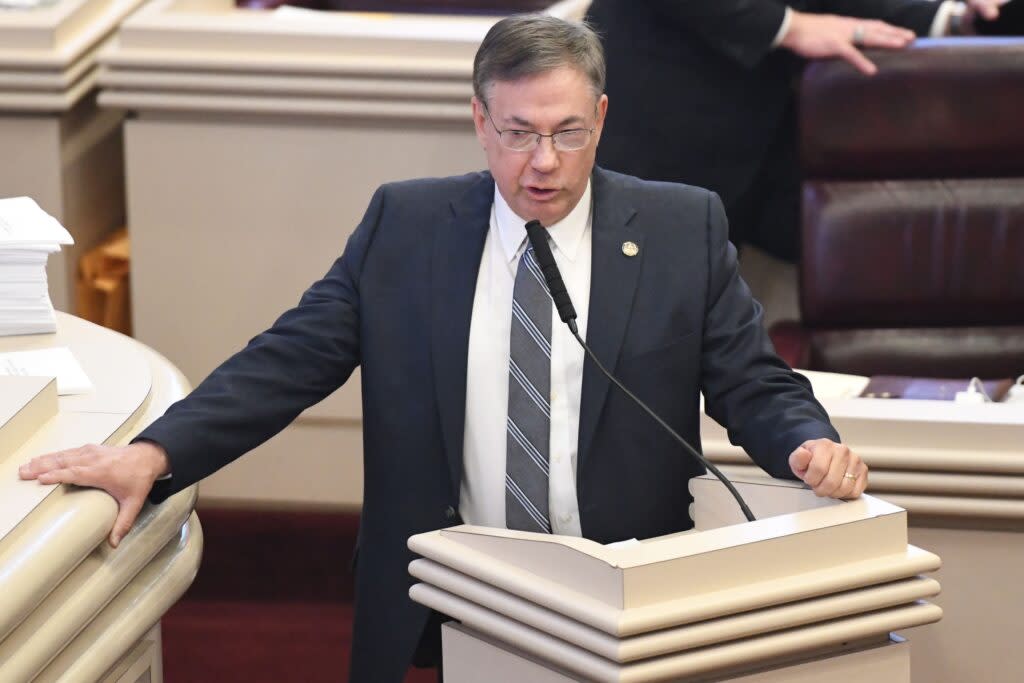Alabama Senate committee approves bill extending ‘Don’t Say Gay’ law

- Oops!Something went wrong.Please try again later.
Rep. Mack Butler, R-Rainbow City, speaks during a debate over his bill expanding Alabama's "Don't Say Gay" law in the Alabama House of Representatives on April 23, 2024 at the Alabama Statehouse in Montgomery, Alabama. The bill would expand the current prohibitions on discussions of gender or sexuality from fifth grade to eighth grade. (Brian Lyman/Alabama Reflector)
A bill that would extend Alabama’s “Don’t Say Gay” law received a favorable report from a Senate committee Wednesday morning, though some members expressed concern over the scope of the bill.
HB 130, sponsored by Rep. Mack Butler, R-Rainbow City, would extend prohibitions on classroom instruction or discussion on sexual orientation or gender identity “that is not age appropriate or developmentally appropriate for students in accordance with state standards” from fifth grade to eighth grade.
The bill would also prohibit K-12 employees from displaying flags “or other insignia relating to or representing sexual orientation or gender identity in a classroom or on the property of a public K-12 school.”
The bill passed 5-2-2. The Alabama House of Representatives approved the legislation on April 24.
The original legislation passed on the last day of the 2022 regular legislative session in an expansion of bathroom bill legislation.
“Don’t Say Gay” laws spread around conservative states amid ongoing right-wing attacks on LGBTQ+ people in public spaces. Florida, which passed its version of the law in 2022, settled a lawsuit in March that required the state to return books with LGBTQ+ characters to a public school library in one county and restore anti-bullying programs that addressed anti-LGBTQ+ bullying, according to the Associated Press.
Butler said there was “a move across this nation to sexualize our children.”
Three members of the public spoke in opposition to the bill, and none spoke in support. Opponents said the bill was likely unconstitutional and would cause harm to children who came from LGBT+ families.
Chris Hathcock, who identified as a resident of Senate District 27, which includes Lee, Tallapoosa and Russell counties, said that a portion of the proposed bill that bans flags reflecting sexual orientation on school property could also apply to bumper stickers.
Hathcock cited the 2015 U.S. Supreme Court decision in Reed et al. v. Town of Gilbert, a case out of Arizona which said that content-based laws are presumptively unconstitutional unless it can be proved there’s a compelling state interest.
In a 9-0 opinion by Justice Clarence Thomas, the court held that restrictions on content on signs on church property were automatically subject to strict scrutiny. Thomas wrote that the First Amendment prohibits censorship and the town had no compelling interest in regulating only one type of sign, according to Oyez.
“The state really doesn’t have an interest in regulating, you know, bumper stickers,” Hathcock said.
Susan Stewart, a Huntsville resident, said that the bill might not impact student speech but could lead to dodged questions or private conferences if a child is confused by another child having two same-sex parents.
“Children will be confused and embarrassed and will wonder ‘What is wrong with my family?’” she said.
Some senators on the committee had concerns about the constitutionality of the law and its extent.
Sen. Rodger Smitherman, D-Birmingham, a former constitutional law professor, said the law would violate equal protection.
“I’ve said what I’m saying about certain bills five times, counting this one, since I’ve been in the Legislature,” he said. “All four of them went to court and were declared unconstitutional. If this goes to court it’s going to be declared unconstitutional.”
Sen. Kirk Hatcher, D-Montgomery, said that he was tired of the Legislature legislating fear, dislikes and morality. He said he felt people were meant to think, and they expose themselves to ignorance if they do not, and that the space was in a “strange space” of trying to codify their fears.
“We also deprive ourselves of the most, I think rewarding experience available to the human spectrum of human possibilities,” he said. “I’m just, I’m sitting here thinking about this type of legislation, which maybe 60 years ago, and how that would apply to me in terms of racial dynamics, and marginalizing people, this notion of sexualizing our children. Now the state is willing to engage in parenting all the children of the state. I don’t, I don’t see, you probably have good intentions. I believe that with all due respect, representative, but I do know the road to hell is paved with good intentions.”
Sen. Larry Stutts, R-Tuscumbia, had questions about the law possibly applying to bumper stickers, but Butler said it wouldn’t apply to parking lots.
“I’m just confused,” said Stutts. “The property is not the parking lot?”
“Well, we’re talking about the actual building,” said Butler.
The bill moves to the full Senate. The bill needs one day to pass; there are four legislative days left in the 2024 legislative session.
Updated at 1:14 a.m. to correct that Chris Hathcock uses they/them pronouns.
The post Alabama Senate committee approves bill extending ‘Don’t Say Gay’ law appeared first on Alabama Reflector.

